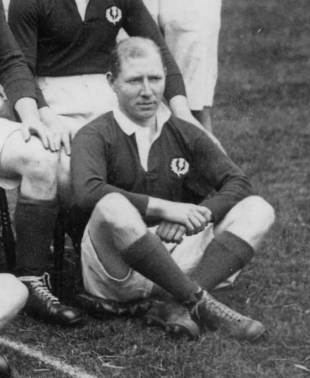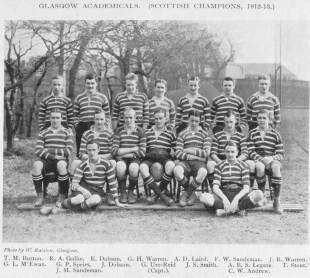|
Ask John
Warren brothers and Frans ten Bos
John Griffiths
November 7, 2012

Ronald Warren lines up ahead of Scotland's international against England in 1930
© Sport & General
Enlarge
Welcome to the latest edition of Ask John where renowned rugby historian John Griffiths will answer any rugby-related query you have! So, if there's something you've always wanted to know about the game we love but didn't know who to ask, or you think you can stump our expert - then get involved by sending us a question. In this edition, John looks at Glasgow's Warren brothers, Scotland's Dutch-born stars, All Blacks' autumn Tests against the home unions, England's overseas born contingent and Faffa Knotze. Were J R Warren (Scotland 1914) and R C Warren (Scotland 1922-30) brothers? They were both capped from Glasgow Academicals. Anon, Australia They are Scottish rugby's forgotten pair of internationalist brothers, probably on account of the eleven-year difference in their ages and the hiatus to rugby caused by the Great War. John Russell (known as Jack) Warren (born Partick, August 13 1889) and Ronald Crawford Warren (born Partick, October 14 1900) were the eldest and youngest sons of John Alexander Warren and his wife, Phoebe Howden. Mr Warren senior was a partner in the family-run civil engineering and surveying firm in Glasgow. He married in 1888 and Jack was the first of five sons and a daughter who were all born in the Partick area between 1889 and 1900. All five sons passed through Glasgow Academy and played for the school's first XV before graduating to the club's senior sides. Indeed, between 1908 (when John established his place in the First XV) and the early 1930s (when Ronald retired), hardly a Glasgow Acads XV took the field without one of the brothers in its back division. The five Warren boys, in birth order, were as follows: John Russell "Jack" (1889-1941) - capped once, against Ireland in 1914, as a centre. He attended Glasgow University and became a partner in the family business. During the Great War he served in France with the Royal Engineers and was mentioned in dispatches. In 1916 he was awarded the M.C. and as Major Warren commanded a field company of the 51st Highland Division. He died in Glasgow in 1941. George Howden (1890-1969) - the speedster of the family, playing on the wing outside Jack in the Glasgow Acads side which won the Scottish club championship in 1912-13. An early historian of Scottish rugby described the brothers as "dependable in any sort of game." George served with the Highland Light Infantry in the Great War. He died in Glasgow in 1969. Thomas Allan (1894-1985) - played full-back for Glasgow Acads in the last season before the Great War. He emigrated, married overseas and died in 1985. His final resting place was in Australia. Alistair Bruce (1895-1916) - considered by some the most promising player in the family. After playing for the Academy XV as full-back in 1913, he turned out regularly for Glasgow Academicals A XV in his first season out of school and was on the verge of establishing himself as the 1st XV full-back when War broke out. He served with the Highland Light Infantry and was killed in action on the opening day of the First Battle of the Somme. His name is on the Thiepval Memorial. Ronald Crawford (1900-1992) - the "baby" of the family. He followed Jack and their father into civil engineering. He played full-back, centre and fly-half for the Academical team from 1919 until the early 1930s and won five caps for Scotland: two as a centre in 1922 and three more, at full-back, in 1930. He died in Glasgow in 1992 aged 91. Their father died in 1961, aged 100, and was survived by three of his sons as well as his daughter, Phoebe (1898-1973).

John Russell Warren is shown standing far right back-row on the 1912-13 Glasgow Acads team. His (next oldest) brother George Howden Warren, who played on the wing outside him in that team, is standing in the middle of that back row on the photo.
© W.Ralston, Glasgow
Enlarge
Has any Dutchman represented Scotland before Tim Visser? Richard Murray, Scotland The best-known Scottish internationalist of Dutch descent was Frans ten Bos, the Oxford University and London Scottish lock who won 17 caps between 1959 and 1963. His father was a Dutch air pilot who made many visits to England during the thirties. On one such visit Frans was born in Richmond in 1937, but the youngster was taken home and spent his infancy in Holland. In 1939, with war clouds forming over Europe, the ten Bos family fled to Britain and settled in Scotland when Frans was one. He was educated at Lathallan and Fettes before winning Blues at Oxford and joining London Scottish. The Scottish selectors soon noticed his line-out and mauling strengths and though he had no Scottish blood in his veins, he was picked to play in the 1959 Calcutta Cup match on the strength of having been educated in Scotland and done his National Service with the Argylls. He went on to become the bulwark of Scotland's packs between 1959 and 1963, taking part in famous wins at Cardiff in 1962 (Scotland's first in the Welsh capital since 1927) and in Paris the year later. Mike Campbell-Lamerton, the skipper of the 1962 Lions, was his second-row partner in both these victories and, all told, the pair packed down together a dozen times for Scotland. Frans ten Bos became a prominent London businessman, his commitments compelling him to withdraw from consideration for the 1962 Lions. What is the All Blacks' Test record against the Home Unions in autumn internationals Mark Stevens, England England is the only Home Union that has secured victories over the All Blacks since short autumn tours began in 1967. They defeated New Zealand 15-9 at Twickenham in 1983 and by the same score there in 1993. There was a draw at Twickenham (26-all) in 1997 (during Sir Clive Woodward's first series in charge of England) and his side beat them 31-28 in November 2002. Since then, the All Blacks have won 18 successive autumn Tests against the four Home Unions. Wales last beat New Zealand 13-8 in Cardiff in December 1953 during an old-style long winter tour. Ireland's best result against them was a 10-10 draw in Dublin in January 1973 (also during a long winter tour) while Scotland drew an autumn Test 25-all against the All Blacks at Murrayfield in 1983. Their only other partial success was a scoreless draw in January 1964 at Murrayfield against Wilson Whineray's touring All Blacks. There is a list of foreign-born All Blacks on the official All Blacks website but other nations do not seem to provide this information. Can you tell me how many foreign-born players have been capped for England? Paul Johns, New Zealand Alex Goode became the 1,345th player capped by England since 1871 when he ran on as a substitute during the Test against South Africa in Johannesburg in June. To the best of knowledge at least 144 - more than 10% - of those capped players were born outside Great Britain, Ireland or the Channel Islands. The breakdown is as follows:
Africa - 45 (of which 31 from South Africa*)
* Freddie Brooks (England 1906) is often given as a South African by birth but there is evidence to suggest that he might have been born in Bombay, India. Further to your recent reference to Martin Knoetze and the World XV against New Zealand in 1992, who was "Faffa" Knotze - also of South Africa? David Anderson, England Francois "Faffa" Knotze was a Western Province threequarter who played outside-centre for the Springboks in their two official Tests against World XVs in 1989. He also played in six non-Test tour games during the Springboks' visit to France and England in the autumn of 1992 - their first post-apartheid tour. To the best of knowledge he was not related to Martin Knoetze who played for the World XV against New Zealand as part of the NZRFU's centenary celebrations in 1992. © ESPN Sports Media Ltd.
|
Live Sports
Communication error please reload the page.
-
Football
-
Cricket
-
Rugby
-
- Days
- Hrs
- Mins
- Secs
F1 - Abu Dhabi GP
Abu Dhabi Grand Prix December 11-131. Max Verstappen ()
2. Valtteri Bottas (Mercedes)
3. Lewis Hamilton (Mercedes)
4. Alexander Albon ()
5. Lando Norris ()
6. Carlos Sainz Jr ()
-
ESPNOtherLive >>
Snooker - China Open
Tennis - Miami Open

